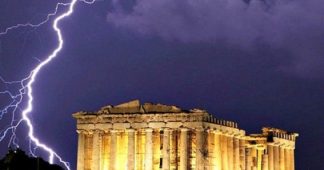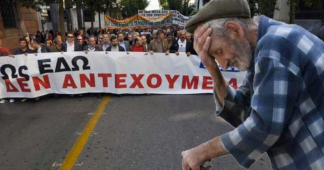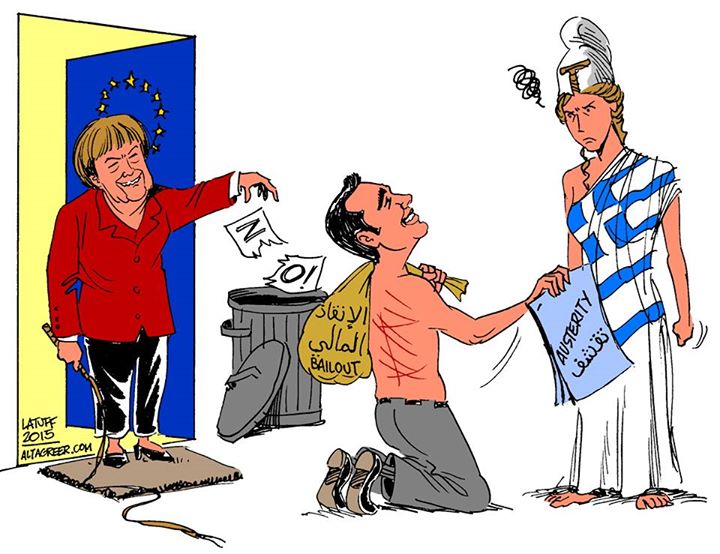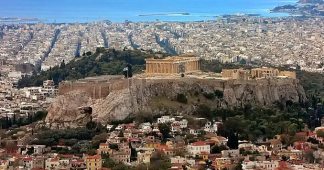Βy Leonidas Petrakis*, PhD
January 26, 2018
For Greece 2004 was a remarkable year. Events that were celebrated with great enthusiasm by Greeks all over the world included,
-winning soccer’s coveted Euro Cup, and in rallies from Athens to Melbourne chanting triumphantly, “Ole, Ole”;
-hosting the successful Athens Olympic Games, for which they barely managed to install the impressive Calatrava arcs, spent profusely on security and opening and closing ceremonies, built Tae-Kwon-Do and baseball stadia, featured throngs of volunteers, and boasted about Athenian drivers changing their behavior (for the duration of the Games) and yielding to Olympic Games vehicles;
-making an impressive appearance in the Istanbul Eurovision with Sakis Rouvas’ Shake It! (and winning outright the first Prize the following year with a Greek American songstress.)
Τhe Greeks (comfortable by then with the euro that authenticated their European identity, proud of their Schengen passports that allowed unencumbered shopping throughout the European Union, gleeful of the easy money that Brussels was making available and later led the Deputy Prime Minister Pangalos to pronounce his infamous “we all ate it together”, putting behind them the crash of the Athens Stock Exchange that had wiped out savings of ordinary citizens newcomers to the markets, showing an insatiable appetite for imports whether luxurious Cayenne and BMW’s or imported lemons (“juicier”), opting for exotic holidays, and making de facto Scotch the national drink) basked in the limelight of their heady achievements in sports arenas and show competitions, and looked to the future with great confidence. The successful Olympics were viewed as a warrantee of the anticipated foreign investments (“We showed the world that we can handle big projects,” boasted a prominent economist.) There was an overabundance of confidence that bordered on “irrational exuberance”.
Profligate borrowing, conspicuous consumption and ephemeral victories (sports and imitation pop culture) were obviously feeble underpinnings for a sustainable healthy economy, and it was inevitable that the “good times” would not last. Indeed there followed the economic crisis with an explosion of unemployment; skyrocketing indebtedness that requires borrowing in order to service the debt; implementation of painful “prerequisites” (targeting the bloated public sector and pensions); unaccustomed levels of taxation; severe cutbacks in the health and education systems; rising energy prices that have forced limiting residential heating; interminable strikes and disruption of services; immigration of many educated younger professionals. This unexpected and unwelcome situation has been further exacerbated by the streams of refugees inundating the country, which in effect has been abandoned by its hypocritical EU partners hiding behind the “Dublin II” excuse and refusing to share fairly in handling the tragedy.
The political leadership during these crucial years, after several elections and Government changes, has proven inept at best at stemming the deepening economic crisis, yet obviously comfortable in its own privileges has reduced the political process to a vying as to who could manage better the disaster. The political dysfunctionality has featured abundant invective and at times even physical attacks reminiscent of parliaments of “lesser democracies”.
The globalization of contemporary human activity that we are experiencing obviously entails erasing local particularities, whether economic (e.g. eliminating national currencies), linguistic, or even artistic. Greece, given its current economic and political woes, has been particularly vulnerable to these flattening tendencies that go under the rubric of “reforms”, some being imposed by outsiders, while others are home grown according to ideologies or interests of those in power. The glowing international praise after the Olympics gave way to the yellow journalism of the German press that even found its way in the American presidential campaigns. The country has lost its way, and in effect surrendered its very sovereignty to the lenders. Passing successfully its periodic “evaluation” so that the lenders will release the next “dose” (the tranche of money for essentially servicing the debt) has become the central national preoccupation.
These trends have alarmed leading intellectuals who fear that beyond the financial crisis and political incompetence are looming existential dangers for the national and cultural identity of the country. Christos Giannaras, for example, concerned about the country’s “linguistic continuity and historical self-consciousness” asks, “is there anything worse than the historical death of a people?”, and he posits, “We are a society drowned ever hopelessly in an aphasia of decline. We have experienced the most nightmarish things that we could imagine. And we continue deceiving ourselves, like babies, with false illusions. For how much longer?”
There have been many serious even existential challenges to Greece’s fortunes during its long history. The years following the Asia Minor Catastrophe of 1922 were particularly daunting with severe challenges: countless refugees uprooted from their homeland in Asia Minor, an impoverished economy, war fatigue, political instability and violence, dictatorship and internal displacements, the shrinking of the Hellenic World, the destruction of the myths that had nourished the modern Greek state, and cultural upheavals. The post-World War I developments in Europe (the entire continent being consumed by efforts to regain its bearings in the face of institutions shattered by that war and an even greater one looming) exacerbated Greece’s predicament as it also was seeking to survive, modernize and be relevant in its European place.
In this chaotic and challenging environment there appeared the so-called “Generation of the ‘30’s ” –a diverse group of artists and intellectuals – that is widely acknowledged as having reshaped the literary and artistic expressions in Greece for decades that followed. They committed almost entirely to modernity (Photis Kontoglou was a notable exception), while remaining faithful to the ideals of Hellenism and its importance for the present times.
Poetry, so crucial in the history of Hellenism from Homeric times onward, was where some of the earliest stirrings of renewal appeared. The dominant literary figure of Greece in the early twentieth century was Kostis Palamas whose work also gave expression to national aspirations (“The Great Idea”) for regaining Greece’s lost glory. Cavafis with his inimitable diction offered early expressions of modernism but he died in 1933 just as the “Generation of the ‘30’s” was making its presence, while Kostas Karyotakis in his tragically shortened life (he committed suicide in 1928) provided an impetus to Greece’s march towards artistic modernity. But it was the towering figures of that celebrated group –George Seferis, Odysseas Elytis, George Theotokas, Nikos Hatzikyriakos-Gikas, and the others- that shaped Greek culture and by extension impacted the sense of national identity. A remarkable feature of that generation was that by focusing on Hellenism they created a big tent that accommodated a broad spectrum of artistic and even political perspectives, from Theotokas and Kontoglou, to Seferis and Gatsos, to Ritsos, Vrettakos and Politis.
For the “Generation of the ‘30’s” modernity and tradition were not a zero sum game. They rejected the sterile worship of the Hellenic past, instead they countenanced it as a source of inspiration for our times. Homer and Aeschylus were their teachers, but so were Kornaros, the demotic poetry, Makriyiannis and Papadiamantis; they relished classical art but also Byzantium, Panagiotis Zographos, the painter of the War of independence, and later Theophilos; they appreciated the Greek musical Modes of antiquity but also Rembetica and Tererem. They did not imitate, but established their own modern idiom taking advantage of the boundless riches and continuity of the Greek language. They created a distinctly Hellenic product that could stand up to the best of the West and make Greeks proud.
This explosion of creativity was recognized with two Nobel Prizes (Seferis and Elytis) and two Lenin Prizes (Varnalis and Ritsos) for Literature. (Several other Greeks were nominated for the Nobel -Kazantzakis, Sikelianos, Palamas, Vrettakos- and would have won were it not for the deplorable campaigns against some of them by fellow Greeks because of ideological differences.)
After World War II the spirit of renewal spread widely, and highly talented and creative individuals catalyzed and brought about an amazing flowering of the contemporary Greek genius. Mikis Theodorakis, Manos Chatzidakis and others put Modern Greek music on the world stage; Minotis and Koon staged performances of classical drama that became the world standard; film directors Cacoyiannis, Angelopoulos, Gavras gained international recognition, as did graphic artists and painters, Tsarouhis, Tassos, Sikelianos and many others; and Maria Callas was triumphant on the world opera scene.
We have come very far down from those genuinely heady years, and it is especially painful watching the downward spiraling being accompanied by the numbing drumbeat of Greece’s mass media, truly a “cultural wasteland”, with a cacophony of mostly imported drivel and fatuous promises of imminent better times. The current valley of national despondency is dark and made longer by the failures of the economic and political elite. Hopefully a new generation will emerge, reassert its Hellenism like the “Generation of the ‘30s” did then, and provide the spark for renewal needed for Greece to find its way again. There are outstanding pockets of creativity that offer hope for such a development –the Diaspora is thriving with stellar individual achievements; and in Greece, under the most adverse conditions, university researchers are doing world class work that points to the future, while outstanding scholars continue to discover and present our inspiring past. Hellenism of course with its momentum of thousands of years will continue going forward. George Seferis in his Mythistorema, one of the seminal works of the “Generation of the ‘30’s”, makes that assertion (transformed into a stirring march by Mikis Theodorakis) that is most relevant for today’s challenges,
“A little farther
we will see the almond trees blossoming
the marble gleaming in the sun
the sea breaking into waves
a little farther,
let us rise a little higher.”
* Leonidas Petrakis holds a PhD in Physical Chemistry from the University of California, Berkeley; has taught at various universities—in the US, France and Greece; was Department Chairman and Senior Scientist at Brookhaven National Laboratory; and worked in the private sector. He specialized in energy and environmental issues, and has authored, coauthored, or co-edited six books and more than one hundred and fifty scientific studies in peer-reviewed journals. He divides his time between Oakland, CA, and Athens
Published at https://www.thenationalherald.com/











